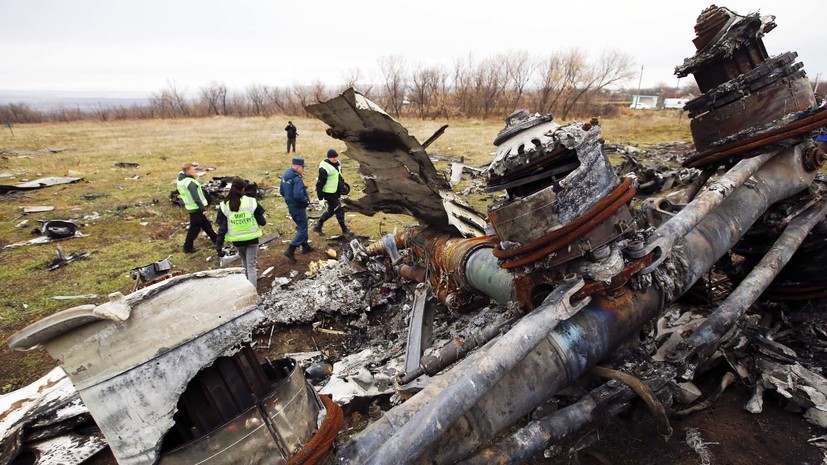The Dutch authorities refused Moscow to hold a trial in Russia over persons suspected of involvement in the crash in the sky over Ukraine of a Boeing 777, which was flying on July 17, 2014 with flight MH17. This became known from a letter from the Minister of Justice and Security of the Netherlands Ferdinand Grapperhaus to the national parliament.
As follows from the document, on October 17, 2019, the Ministry of Justice of the Kingdom received a request from the Russian side to transfer criminal proceedings against three suspects, citizens of the Russian Federation, in the case of a plane crash.
In response to this, Grapperhouse said that such a development is not considered as an option for the Dutch authorities and will not be taken into account. At the same time, he invited the Russian authorities to study the possibility of enforcing the judgment of the Netherlands court in Russia and ensure the execution of the sentence in the event of a conviction.
Recall that in June 2019, the joint investigation team to investigate the crash of the Malaysian Boeing in the sky over the Donbass in 2014 named the names of four people suspected of involvement in the MH17 plane crash. They were allegedly involved in transporting the Buk anti-aircraft missile system to Ukraine.
Three Russian citizens were suspected - the former Minister of Defense of the self-proclaimed Donetsk People’s Republic Igor Girkin, the former head of the DPR intelligence, Sergei Dubinsky and his former deputy Oleg Pulatov, as well as the Ukrainian Leonid Kharchenko. They were charged with murder and put on the international wanted list.
March 9 will be the first hearing in the crash case of the Malaysian Boeing. According to TASS, the lawyer of one of the accused, Elena Kutina, the defense will participate in a court hearing in The Hague. In turn, Igor Girkin noted that he was not aware of the proposal that the Russian side made to the Netherlands.
“I don’t know anything about this. But my position remains the same, no matter where the trial takes place - the Boeing militia did not bring down, ”RBC quotes him.
Please note that on December 23, 2019, the letter of Foreign Minister Stef Blok to the Parliament on the strategy for further development of relations with Russia was published on the website of the Dutch government. The document, in particular, indicated that the kingdom had asked Moscow for cooperation on the investigation of the non-closure of airspace over the eastern part of Ukraine on the day of the crash of MH17. Commenting on this proposal, Russian Permanent Representative to the EU Vladimir Chizhov noted that the Russian side from the very beginning was ready to cooperate with the CCG on any aspects of the investigation, but these proposals were ignored.
"Objective" doubts about the objectivity of the SSG position
Chairman of the Federation Council Committee on Foreign Affairs Konstantin Kosachev recalled that from the very first days after the disaster, the investigation began to claim that Russia was allegedly responsible for the tragedy.
“All facts and hypotheses that did not fit into this version were either rejected, or hushed up, or distorted. There is a lot of evidence that the evidence base in the investigation does not take into account the huge amount of information that was transmitted by the Russian side and which, at a minimum, should have received an expert assessment. That did not happen. Moreover, in a number of cases, and this is also widely known, some hasty conclusions of the investigative group, which later did not receive confirmation, were not commented on in any way, ”the source said.
In his view, the upcoming trial is also likely to be equally biased.
In turn, the first deputy chairman of the State Duma’s committee on international affairs, Dmitry Novikov, also pointed to the unilateral position of the investigation into the plane crash in the sky over Ukraine.
“If the flight was international, if there are many questions, if a wide assessment of specialists is needed, then the more experts will study the situation, interested or outside observers, the larger the circle of competent persons at the stage of studying the situation and assessing it, when it comes to specific conclusions and litigation, the breadth of view, of course, can only be welcomed, ”he said in an interview with RT.
According to him, attempts to narrow the circle of those involved in the assessment of what happened may indicate a disinterest in a comprehensive study of the problem.
“Unfortunately, this is not the first time we have encountered the bias of our Western colleagues in investigating various problems. And this is one of those issues where such engagement clearly goes outside, ”the parliamentarian explained in an interview with RT.

